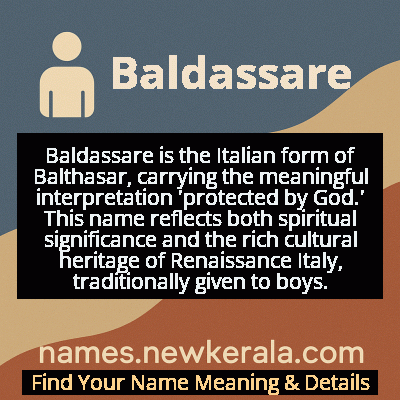Baldassare Name Meaning & Details
Origin, Popularity, Numerology Analysis & Name Meaning of Baldassare
Discover the origin, meaning, and cultural significance of the name BALDASSARE. Delve into its historical roots and explore the lasting impact it has had on communities and traditions.
Name
Baldassare
Gender
Male
Origin
Italian
Lucky Number
1
Meaning of the Name - Baldassare
Baldassare is the Italian form of Balthasar, carrying the meaningful interpretation 'protected by God.' This name reflects both spiritual significance and the rich cultural heritage of Renaissance Italy, traditionally given to boys.
Baldassare - Complete Numerology Analysis
Your Numerology Number
Based on Pythagorean Numerology System
Ruling Planet
Sun
Positive Nature
Leaders, ambitious, highly driven, self-reliant, innovative.
Negative Traits
Overly aggressive, domineering, impatient, selfish.
Lucky Colours
Red, orange, gold.
Lucky Days
Sunday.
Lucky Stones
Ruby, garnet.
Harmony Numbers
2, 3, 9.
Best Suited Professions
Entrepreneurs, managers, engineers.
What People Like About You
Courage, determination, leadership.
Famous People Named Baldassare
Baldassare Castiglione
Diplomat and author
Authored 'The Book of the Courtier', defining Renaissance ideals of the perfect gentleman
Baldassare Longhena
Architect
Designed Santa Maria della Salute and other major Venetian Baroque buildings
Baldassare Galuppi
Composer
Influential 18th-century opera composer known for developing opera buffa
Baldassare Peruzzi
Architect
Renaissance architect who designed Villa Farnesina and influenced Roman architecture
Name Variations & International Equivalents
Click on blue names to explore their detailed meanings. Gray names with will be available soon.
Cultural & Historical Significance
Extended Personality Analysis
Men named Baldassare are typically perceived as possessing a refined and dignified character, often exhibiting the intellectual depth and cultural sophistication associated with the name's Renaissance heritage. They tend to be thoughtful, articulate individuals with strong diplomatic skills and an appreciation for beauty in all its forms - whether in art, architecture, music, or literature. Their personality often combines traditional values with creative thinking, making them both respectful of heritage and open to innovation. Baldassares are frequently seen as reliable and principled individuals who carry themselves with a natural authority and grace. They typically demonstrate strong leadership qualities tempered by empathy and cultural awareness, making them effective in roles that require both vision and interpersonal skills. While they may appear reserved at first, they often reveal a warm, engaging personality with deep convictions and a strong sense of purpose. Their combination of intellectual curiosity and practical wisdom makes them valued advisors and respected figures in their communities.
Modern Usage & Popularity
In contemporary Italy, Baldassare remains a traditional name that carries significant cultural weight while being relatively uncommon in daily use. It maintains strongest presence in central and northern regions, particularly in areas with rich Renaissance history like Tuscany, Umbria, and the Veneto. While it rarely appears on modern popularity charts, the name continues to be chosen by families seeking to honor Italian cultural heritage and maintain connections to the country's artistic and intellectual golden age. There has been a modest revival among educated, culturally-conscious parents who appreciate the name's historical significance and distinctive, elegant sound. The name is more frequently encountered in academic, artistic, and professional circles than in general population, and it remains more common in Italy itself than among Italian diaspora communities abroad, where shorter, more modern Italian names tend to be preferred.
Symbolic & Spiritual Meanings
Baldassare carries rich symbolic meanings that extend beyond its literal translation of 'protected by God.' The name symbolizes the journey toward wisdom and enlightenment, echoing the Magi's quest for spiritual truth. It represents the Renaissance ideal of balanced excellence - the harmony between intellectual pursuit, artistic expression, and practical leadership. Symbolically, Baldassare embodies cultural continuity and the preservation of heritage, serving as a bridge between ancient traditions and modern innovation. The name also signifies divine protection and guidance, suggesting a life path marked by purpose and spiritual awareness. In broader terms, it represents the Italian cultural legacy of combining beauty with intellect, faith with reason, and individual achievement with social responsibility. The name evokes images of candlelit libraries, Renaissance palaces, and the enduring pursuit of knowledge and beauty that defines humanistic values.

